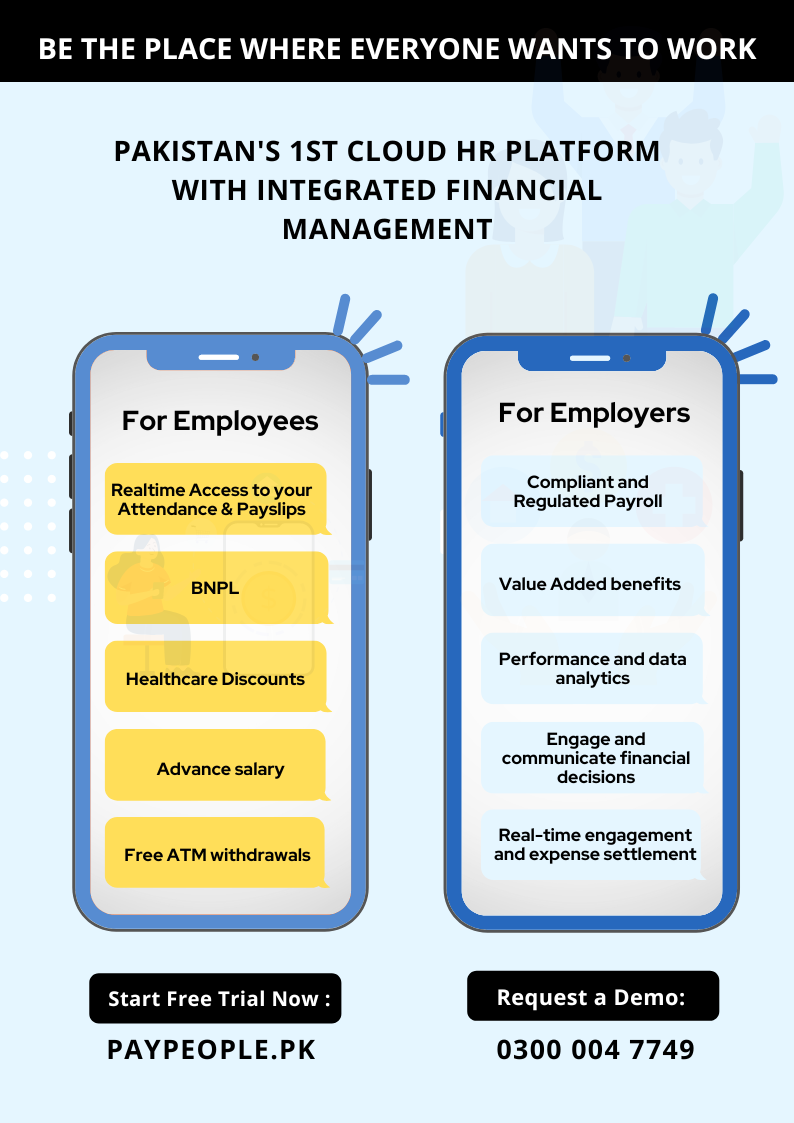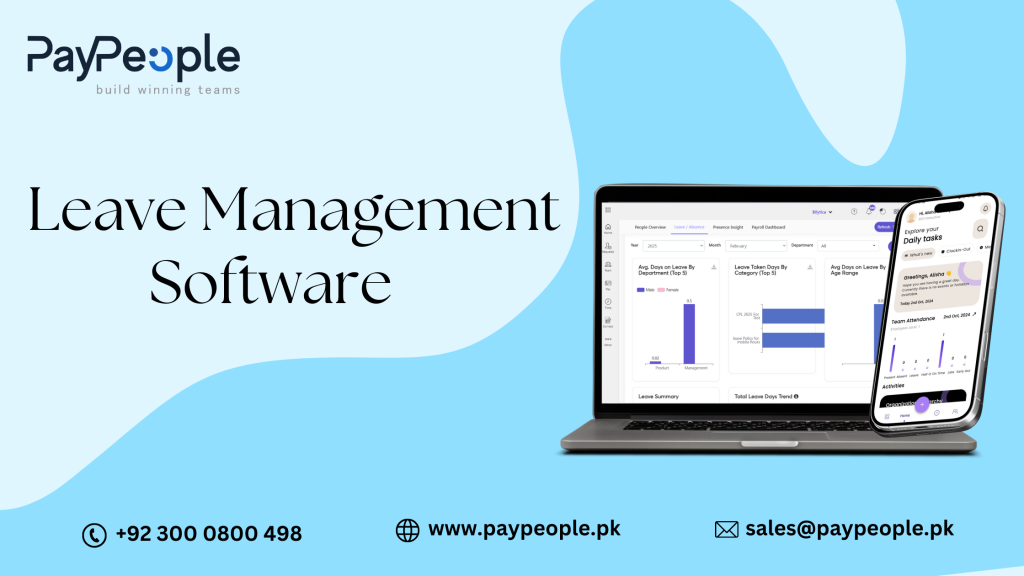Paypeople # 1 is one of the top HRMS in Pakistan In today’s rapidly evolving business landscape, organizations recognize the importance of fostering a culture of continuous learning and development to remain competitive. Human Resource Management Systems have emerged as powerful tools to support and promote a learning-oriented environment within organizations. By leveraging the capabilities of HRMS, organizations can facilitate continuous learning, enhance employee skills, and drive professional growth. In this blog, we will explore how HRMS promotes a culture of continuous learning and development, with a focus on the following key areas:
Click to Start Whatsapp Chat with Sales
Call #:+923000507555
Email: sales@bilytica.com
Paypeople # 1 HRMS in Pakistan

Access to Learning Resources
HRMS platforms provide employees with easy access to a wide range of learning resources. Through integrated learning management systems or integrations with external training platforms, employees can explore online courses, webinars, e-books, and other educational materials. HRMS in Pakistan acts as a centralized hub for learning resources, making it convenient for employees to discover and engage in self-paced learning opportunities.
Personalized Learning Paths
HRMS empowers employees by offering personalized learning paths tailored to their unique development needs. Through data analytics and AI-driven algorithms, HRMS can assess employee skills, competencies, and learning preferences. Based on this information, HRMS recommends learning opportunities, suggests relevant courses, and tracks individual progress. Personalized learning paths enable employees to focus on areas that align with their career goals and foster continuous development.
Skill and Competency Assessments
HRMS facilitates skill and competency assessments, allowing employees to evaluate their current capabilities and identify areas for improvement. By integrating assessment tools within the platform, HRMS in Pakistan enables employees to assess their skills and competencies against predefined criteria or industry standards. These assessments provide valuable insights for employees and their managers, guiding them in creating targeted development plans to bridge skill gaps and nurture growth.

Continuous Performance Feedback
HRMS platforms play a vital role in supporting continuous performance feedback, which is integral to a culture of continuous learning. Performance Management Software in Lahore provides a mechanism for ongoing feedback exchanges between employees and their managers. This real-time feedback enables employees to receive constructive input on their performance, identify strengths, and areas for improvement. Continuous performance feedback nurtures a learning mindset, encouraging employees to continuously seek opportunities for growth and development.
Gamification and Microlearning
HRMS incorporates gamification and microlearning elements to make the learning experience engaging and interactive. Gamification features, such as badges, points, and leaderboards, create a sense of friendly competition and motivation among employees. Microlearning modules deliver bite-sized, focused content that can be consumed quickly and easily. By integrating gamification and microlearning, HRMS encourages employees to engage in learning activities regularly, fostering a culture of continuous learning.
Learning Communities and Collaboration
HRMS platforms often include features that facilitate learning communities and collaboration. These features enable employees to connect with peers, subject matter experts, and mentors, fostering knowledge sharing and collaborative learning. Through discussion forums, virtual classrooms, and social learning features, Payroll Software in Islamabad promotes a culture of collective learning and encourages employees to share insights, best practices, and resources with one another.
Conclusion
HRMS plays a pivotal role in cultivating a culture of continuous learning and development within organizations. By providing access to learning resources, personalized learning paths, skill assessments, continuous performance feedback, gamification, microlearning, learning communities, and learning analytics, HRMS empowers employees to take ownership of their learning journeys and invest in their professional development. HRMS acts as a catalyst for continuous learning, enabling employees to acquire new skills, expand their knowledge, and stay updated in a rapidly changing business landscape. Through HRMS, organizations foster a culture that values growth, collaboration, and innovation. As organizations recognize the importance of continuous learning for their long-term success, leveraging the capabilities of HRMS becomes crucial in promoting a culture of continuous learning and development.
Click to Start Whatsapp Chat with Sales
Call #:+923000507555
Email: sales@bilytica.com
HRMS in Pakistan
HRMS in Pakistan
HRMS in Pakistan
HRMS in Pakistan
We are one of the best How HRMS in Pakistan promote culture of continuous development? Price in Pakistan in Azad Kashmir, Bagh, Bhimber, khuiratta, Kotli, Mangla, Mirpur, Muzaffarabad, Plandri, Rawalakot, Punch, Balochistan, Amir Chah, Bazdar, Bela, Bellpat, Bagh, Burj, Chagai, Chah Sandan, Chakku, Chaman, Chhatr, updated on 2025-07-12T07:31:55+05:00 Dalbandin, Dera BugtiBarcode Shop offer lowest How HRMS in Pakistan promote culture of continuous development? Price Face Recognition in cities Dhana Sar, Diwana, Duki, Dushi, Duzab, Gajar, Gandava, Garhi Khairo, Garruck, Ghazluna, Girdan, Gulistan, Gwadar, Gwash, Hab Chauki, Hameedabad, Harnai, Hinglaj, Hoshab, Ispikan, Jhal, Jhal Jhao, Jhatpat, Jiwani, Kalandi, Kalat, Kamararod, Kanak, Kandi, Kanpur, Kapip, KapparWe can deliver Face Recognition in Karodi, Katuri, Kharan, Khuzdar, Kikki, updated on 2025-07-12T07:31:55+05:00 Kohan, Kohlu, Korak, Lahri, Lasbela, Liari, Loralai, Mach, Mand, Manguchar, Mashki Chah, Maslti, Mastung, Mekhtar, Merui, Mianez, Murgha Kibzai, Musa Khel Bazar, Nagha Kalat, Nal, Naseerabad, Nauroz Kalat, Nur Gamma, Nushki, Nuttal, Ormara, Palantuk, Panjgur, Pasni, Piharak, Pishin, Qamruddin Karez, Qila Abdullah, Qila Ladgasht and this was updated on 2025-07-12T07:31:55+05:00
We also deal with How HRMS in Pakistan promote culture of continuous development? Price in Qila Safed, Qila Saifullah, Quetta, Rakhni, Robat Thana, Rodkhan, Saindak, Sanjawi, Saruna, Shabaz Kalat, Shahpur, Sharam Jogizai, Shingar, Shorap, Sibi, Sonmiani, Spezand, Spintangi, Sui, Suntsar, Surab, Thalo, Tump, Turbat, Umarao, pirMahal, Uthal, Vitakri, Wadh, Washap, Wasjuk, Yakmach, Zhob, Federally Administered Northern Areas/FANAWe are already sent Face Recognition to these places – Astor, updated on 2025-07-12T07:31:55+05:00 Baramula, Hunza, Gilgit, Nagar, Skardu, Shangrila, Shandur, Federally Administered Tribal Areas/FATA, Bajaur, Hangu, Malakand, Miram Shah, Mohmand, Khyber, Kurram, North Waziristan, South Waziristan, Wana, NWFP, Abbottabad, Ayubia, Adezai, Banda Daud Shah, Bannu, Batagram, Birote, Buner, Chakdara, Charsadda, Chitral, Dargai, Darya Khan, Dera Ismail Khan and this was updated on 2025-07-12T07:31:55+05:00
we are planning to open a branch office of in Drasan, Drosh, Hangu, Haripur, Kalam, Karak, Khanaspur, Kohat, Kohistan, Lakki Marwat, Latamber, Lower Dir, Madyan, Malakand, Mansehra, Mardan, updated on 2025-07-12T07:31:55+05:00 Mastuj, Mongora, Nowshera, Paharpur, Peshawar, Saidu Sharif, Shangla, Sakesar, Swabi, Swat, Tangi, Tank, Thall, Tordher, Upper Dir, Punjab, Ahmedpur East, Ahmed Nager Chatha, Ali Pur, Arifwala, Attock, Basti Malook, BhagalchurFace Recognition in Bhalwal, Bahawalnagar, Bahawalpur, Bhaipheru, Bhakkar, Burewala, Chailianwala, Chakwal, Chichawatni, Chiniot, Chowk Azam, Chowk Sarwar Shaheed, Daska, Darya Khan, Dera Ghazi Khan, Derawar Fort, updated on 2025-07-12T07:31:55+05:00 Dhaular, Dina City, Dinga, Dipalpur, Faisalabad, Fateh Jang, Gadar, Ghakhar MandiFace Recognition How HRMS in Pakistan promote culture of continuous development? Price s Demands very high in Gujranwala, Gujrat, Gujar Khan, Hafizabad, Haroonabad, Hasilpur, Haveli Lakha, Jampur, Jhang, Jhelum, Kalabagh, Karor Lal Esan, Kasur, Kamalia, Kamokey, Khanewal, Khanpur, Kharian, Khushab, Kot Addu, Jahania, Jalla Araain, Jauharabad, Laar, Lahore, Lalamusa, Layyah, Lodhran, Mamoori, Mandi Bahauddin, Makhdoom Aali, Mandi Warburton, Mailsi, Mian Channu, Minawala, Mianwali, Multan, Murree, Muridke, Muzaffargarh, Narowal, Okara, Renala Khurd, Rajan Pur, Pak Pattan, Panjgur and this was updated on 2025-07-12T07:31:55+05:00 and current How HRMS in Pakistan promote culture of continuous development? Price of is Rs 100 in Pattoki, Pirmahal, Qila Didar Singh, Rabwah, Raiwind, Rajan Pur, Rahim Yar Khan, Rawalpindi, Rohri, Sadiqabad, Safdar Abad – (Dhaban Singh), Sahiwal, Sangla Hill, Samberial, Sarai Alamgir, Sargodha, Shakargarh, Shafqat Shaheed Chowk, Sheikhupura, Sialkot, Sohawa, Sooianwala, Sundar (city), Talagang, Tarbela, Takhtbai, Taxila, Toba Tek Singh, Vehari, Wah Cantonment, Wazirabad and this was updated on 2025-07-12T07:31:55+05:00
Software solutions are widely available with Price updated on 2025-07-12T07:31:55+05:00 in Sindh, Ali Bandar, Baden, Chachro, Dadu, Digri, Diplo, Dokri, Gadra, Ghanian, Ghauspur, Ghotki, Hala, Hyderabad, Islamkot, Jacobabad, Jamesabad, Jamshoro, Janghar, Jati (Mughalbhin), Jhudo, Jungshahi, Kandiaro, Lahore, Kashmor, Keti Bandar, Khairpur, updated on 2025-07-12T07:31:55+05:00 Khora, Klupro, Khokhropur, Korangi, Kotri, Kot Sarae, Larkana, Lund, Mathi, Matiari, Mehar, Mirpur Batoro, Mirpur Khas, Mirpur Sakro, updated on 2025-07-12T07:31:55+05:00 Mithi, MithaniThe Barcode Shop deliver high quality Face Recognition in updated on 2025-07-12T07:31:55+05:00 Moro, Nagar Parkar, Naushara, Naudero, Noushero Feroz, Nawabshah, Nazimabad, Naokot, Pendoo, Pokran, Qambar, Qazi Ahmad, Ranipur, Ratodero, Rohri, Saidu Sharif, Sakrand, Sanghar, Shadadkhot, Shahbandar, Shahdadpur, Shahpur Chakar, Shikarpur, Sujawal, Sukkur, Tando Adam, Tando Allahyar, Tando Bago, Tar Ahamd Rind, Thatta, Tujal, Umarkot, Veirwaro, Warah and this was updated on 2025-07-12T07:31:55+05:00
06-07-2023


